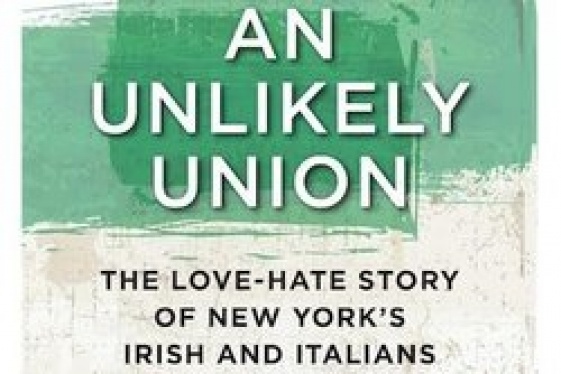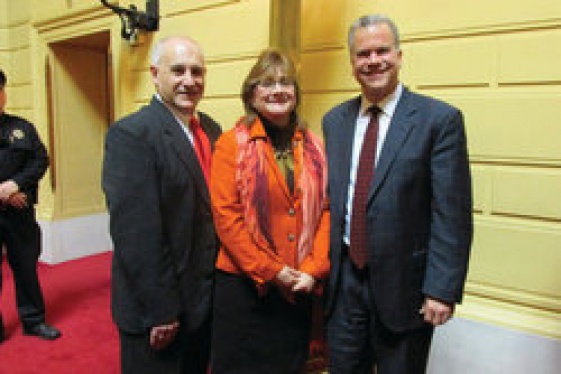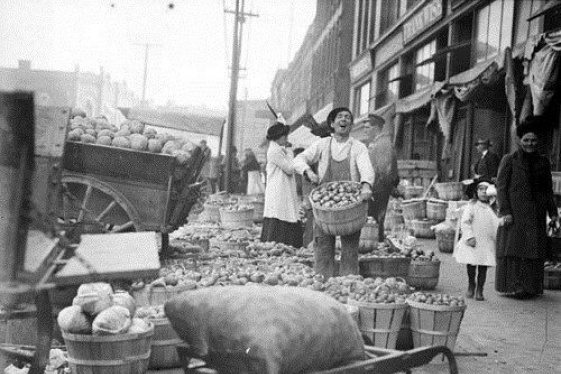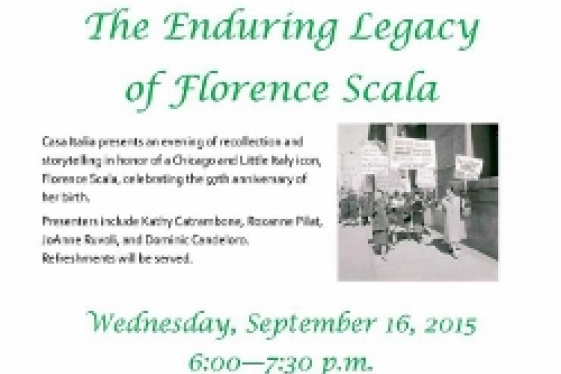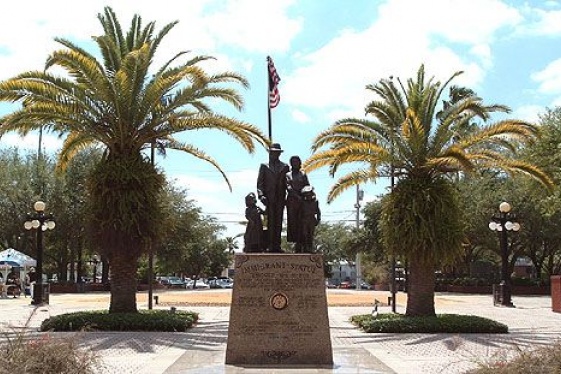
Robert Allegrini (President of the National Italian American Foundation)
Benvenuto su We the Italians a Robert Allegrini, il nuovo Presidente della National Italian American Foundation

It's not easy to take over the reins of NIAF at this time, with a pandemic that is still doing damage and casualties, and that has left major economic and social problems in the United States. Several programs of the National Italian American Foundation, as well as other national and local Italian American and non-Italian American organizations, have been cancelled in the last 18 months, and things are picking up, yes, but more slowly than hoped.
In spite of this, NIAF - which is without a doubt the most popular, well-known and representative institution of the wonderful Italian American community - has recently renewed its leadership: and once again, as it always does, it has chosen people of great experience, ability and passion for Italy. At We the Italians, we are particularly happy and honored to host the new President of NIAF, who is also a personal friend of mine for years, a great Italian American who is very proud of his roots: Robert Allegrini.
Dear Robert, I would start by asking you about your Italian origins: your roots are in northern Italy, right?
Yes, I am a representative of the 15% or so of Italian Americans with roots outside of the Mezzogiorno. But I frankly attach little importance to old North/South divides. For more than 150 years there has only been one Italy which must remain sacrosanct and supersede any regional loyalties. Part of the problem, as I see it, with Italians, and by extension Italian Americans, is that they still consider themselves Milanese or Napoletani, as examples, before they consider themselves Italian. This has a debilitating effect on national cohesion that serves no one well. People must think in terms of the greatness of Italy as a whole and not solely of their region of origin.
But to answer your question about my specific roots, I have a grandmother born in Piemonte from a family with branches in both Piemonte and Val D’Aosta, a grandfather from Tuscany and another from the Tuscany/Lazio border in the heart of ancient Etruria. My mother was born in Lucca, but her mother was born in Dayton, Nevada. I’m very proud of the Western U.S. roots of my family. My great grandparents were married in Virginia City, Nevada (now a famous ghost town) back in 1896. They were true American pioneers. Unfortunately, my great grandmother contracted typhoid and the doctors told her that her recovery would be aided by the climate back in Italy, so they returned there. The part of the family that remained in Nevada prospered. My cousin, Bill Raggio, was the longest serving State Senator in Nevada history and I am proud to say was honored with a NIAF Lifetime Achievement Award in 1999.
Your career as an Italian American involved in the representation and promotion of Italy in America is quite long, both locally and nationally. Please describe it for our readers
Some might say I was destined for this involvement because my mother worked at the Italian Consulate General in Chicago throughout the 1950s. Moreover, I have always had a passion for history and knowing the history of Italian contributions to the world, I have always been a proud Italian American. This pride helped shape my educational and career choices. I spent a summer during college at the Università per stranieri in Perugia, Umbria and then a year of graduate school at the Cesare Alfieri political science faculty of the University of Florence, Tuscany.
When I returned to Chicago, I wanted to do something Italian related, so I served for 3 years as the full time Executive Director of the Joint Civic Committee of Italian Americans which is the umbrella association comprised of more than 50 different Italian American organizations in the Chicago area.
I then spent the next 3 decades in hospitality public relations including 10 years as Vice President of Communication for Hilton in the Americas immediately before assuming my current role as President of NIAF. But throughout those 3 decades I always stayed involved and active in the Italian American Community. I served for 3 years as President of the Italian American Chamber of Commerce of the Midwest and founded the Chicago Chapter of the Academia Italiana della Cucina. I also served on the board of the Chicago-Milano Sister City Committee, the National Italian American Sports Hall of Fame, and the Italian American Human Relations Foundation of Chicago. I have been involved in NIAF since the late 1980s and have served as a NIAF Area Coordinator, Regional Vice President, Board Director and Board Officer before becoming the foundation’s President in May.
I see, you’ve been devoted to NIAF for a long time: what drives your commitment to the foundation?
Simply put, it’s because the mission of the foundation conforms to my world view. And that view, equally simply put, is that the world would be a better place if only it were a bit more Italian.
Now I know and I appreciate that every ethnic group has made very valuable contributions to America which is one of the reasons it is a truly unique and exceptional nation. But I can’t help but believe that we would all be living better if only we lived more as Italians. Surely we would all be eating better and drinking better. We would be more artistic and more musical lest we forget that Italian is the very language of music. We would be more stylish and more passionate lest we forget that Romeo, Casanova and Valentino were all Italian but the most important thing to my mind is that if we were more Italian we would have a greater sense of humanity.
This incredible sense of humanity that characterizes the Italians is to my mind at the core of our identity. When people think of Italy they often can’t get beyond the incredible food or the amazing architecture or the beautiful fashion. But as the great English writer E.M. Forster wrote long ago, “Don’t, I beg you, go with that awful tourist idea that Italy is only a museum of antiquities and art. Love and understand the Italians for the people are more marvelous than the land.”
Now when you take Forster’s advice and study the Italian people and their history you see a continuum of incomparable humanity. From the time of ancient Rome when Italy built an Empire based not on enslavement but on inclusion, through the Italian Renaissance which produced the greatest concentration of cultural achievement the world had ever known, to the darkest days of world war II when the Italian people and indeed the Italian army resorted to every possible means to protect both Italian Jews and the foreign Jews in its control from the Nazi’s you see a pattern of humanity and a culture that is tolerant, accepting and broadminded.
As the acclaimed Wall Street Journal writer Dorothy Rabiniwitz opined on this subject of the Italian role in the Holocaust, “What there was in the character of the Italians that made their resistance to mass murder so implacable is a question we may ponder and one for whose existence we may be grateful.”
Of course being fully human also means being flawed and Italy has had and continues to have its share of unique, flawed characters and even flawed national characteristics. But in their totality, the Italians are a magnificent people and I for one unabashedly long for the day when Italy regains its just and historic role as the dominant cultural, spiritual and economic force of the Mediterranean basin.
You are the new President of NIAF, but the entire top leadership of this wonderful foundation has been renewed. Please help us remember which other amazing people are on the new NIAF board
Unfortunately, you don’t have enough space for me to extol the virtues of the great Italian Americans who make up the current board of NIAF. But at least I can tell you about our top leaders. Our new Chairman Bob Carlucci is someone who reflects great luster on his Italian heritage. He is an extremely successful, self-made entrepreneur and philanthropist about whom whole chapters have been written in business related books. He is a native Bostonian, and I recently had the pleasure of spending a few days there with his family who are quintessentially Italian in their love for music, food, stories, and each other.
John Calvelli our new Executive Vice Chairman is someone who has devoted much of his life to advancing the interests of Italian Americans having been one of the founders of Fieri, the national Italian American young professionals networking group, at age 20. Today he remains involved in multiple Italian American organizations while at the same time serving as Executive Vice President of Public affairs for the Wildlife Conservation Society.
I'm going to ask you a difficult question, because the answer could be very long: for the few who don't know what NIAF is, can you briefly tell us its history and its activities up to now?
The National Italian American Foundation was born in 1975 to give a voice in the capital to the nation’s 20 million Italian Americans. The mission of NIAF is to preserve the Italian American heritage and culture, to promote and inspire a positive image of the legacy of Italian Americans and to empower ties between the United States and Italy.
It does this in a multitude of ways.
For example one of the foundation’s signature programs is the Voyage of Discovery which takes young Italian Americans on their first trip to Italy to experience the land of their forefathers. To date the foundation has taken almost a thousand young Italian Americans to Italy.
In the last decade alone NIAF has also provided 4.5 Million in direct aid to deserving Italian American students.
It provides funding for College level Italian clubs through its NIAF on Campus Initiative.
The Foundation’s Russo Brothers Film Forum provides funding for films that illuminate various aspects of the Italian American experience.
Grants are given each year for a variety of projects. Last year for example NIAF gave $50,000 toward the creation of the National Columbus Education Foundation which seeks to present a more accurate view of Columbus than the current skewed narrative.
NIAF provides programing both on line and in person on numerous topics of interest to Italian Americans ranging from how to gain Italian dual citizenship to buying a home in Italy to Italian genealogy and Italian food and wine.
We take an active stand in defending the Italian American community on matters of anti-defamation.
NIAF has a strong public affairs component. The foundation works closely with the federal government to ensure that Italian Americans are represented appropriately in the administration.
The foundation also works closely with the Italian American Congressional Delegation. For example last year when a U.S. Senator proposed replacing the Columbus Day holiday with Juneteenth Day NIAF successfully activated the delegation which was able to have the proposal rescinded.
NIAF also sponsors a number of events on Capitol Hill each year through the Frank J Guarini Public Policy Forum which brings leaders from government, business, and science to Capitol Hill to speak out on bipartisan global and national security issues of our times. It covers key issues involving our federal government and our challenges abroad in today’s changing world.
NIAF also sponsors a Congressional Fellowship Program which places outstanding Italian American college students and recent graduates in offices of members of the Italian American Congressional Delegation.
Of course our annual gala has historically been the venue where Presidents of the United States have come to honor the Italian American community and every President of the United States from Reagan through Obama has attended at least one NIAF gala.
NIAF Serves as a bridge to Italy. It aims to strengthen cultural and economic ties between Italy and the U.S. through work with business and political leaders of both countries. Each year NIAF selects one of the 20 regions of Italy to serve as its “Region of Honor” and plans a variety of initiatives together with the region including economic and cultural exchanges and a board of directors trip to the region.
NIAF also serves as a valuable partner to the Italian Embassy in Washington providing introductions and contacts to the embassy staff as well as to visiting Italian officials.
You mentioned the famous NIAF annual gala in Washington D.C. Can you tell us about this year’s gala?
Once again this year, we will be honoring an outstanding group of worthy Italians and Italian Americans at our gala in Washington D.C. on October 23rd. The region of honor is Abruzzo. Among our honorees will be legendary singer Tony Bennett, famed actor and presenter Stanley Tucci, Film Producer Enrico Casarosa, businessman John Silvestri and Fincanteri CEO Giuseppe Bono. This year because of the continuing travel restrictions on citizens of the Schengen Area we are planning a smaller, more intimate gala and out of necessity some of our honorees will be accepting their awards virtually. We are going to package an on-line version of the gala so that it can be viewed by all interested friends of NIAF around the world shortly after the in person gala. We would love to have the readers of We the Italians attend our gala in person but if they can’t we will be bringing the gala to them with our subsequent transmission.
What is the goal of your term as President? Is there anything new we should expect?
As President, I would like to build on our community’s Italian American identity by providing greater access to subject matter that conveys the full richness of our heritage.
Historically I don’t think we’ve done a great job as an ethnic group in teaching our children what it means to be of Italian descent beyond the kitchen and the church. By that I mean we have had too many nonne who have taught their children and grandchildren their recipes and their prayers but regrettably not much else about what it means to be of Italian descent. Consequently we have too many Italian Americans whose Italian identity is defined solely by cuisine and religion.
Now I certainly wouldn’t take anything away from the fundamental nature of either of those elements. Surely as Italian Americans we eat better than anyone on earth and it should be a point of pride that the mother church has been based in the heart of the Italian peninsula for nearly 2 millennia, but the Italian identity is so much richer than simply the kitchen and the church. We need to be teaching our children about the glory of Italian music and art, its science and architecture. We need to be teaching our children about the country’s history and its politics and most certainly the beautiful Italian language.
When we don’t teach our children these things then a pop culture which continues to be fixated on portraying Italian Americans as mobsters or buffoons fills the void which damaging consequences to Italian American self-perception and to the general American perception of Italian Americans.
So one of my principle missions is to build upon NIAF’s grant program and to support more worthy projects such as books, films, plays, websites, exhibits and apps which showcase diverse aspects of Italian and Italian American culture and history.
I won’t be content until all Italian Americans appreciate the full richness of their heritage and until the rest of the country recognizes us as the worthy heirs of a culture that is at the very core of Western Civilization.
Are there also plans to strengthen NIAF presence here in Italy? We the Italians believe that America needs more Italy, and that Italy needs more America, and it would be very important to have an Italian American representation here. Because you Italian Americans are 20 million testimonials of the absolute truth of both sides of our statement and here in Italy there is a great need to always remember that...
I agree completely with We the Italians view on the need for more America in Italy and more Italy in America. There is much we can teach each other. America can teach Italy about the importance of civics, of ecology, of philanthropy and of patriotism all of which, to my mind, still lag in Italy. Meanwhile, Italy can teach America the importance of family, beauty, passion, and culture. It is precisely because Italian Americans embody many of the best qualities and values of both cultures that I believe they are a profound force for good and that they should be valued and utilized by both countries. I have already been to Italy as the President of NIAF and have spoken in person and on Italian television about the importance of NIAF and the need for Italians to support it and I shall continue to do so. We also have our own affiliate organization in Italy called NIAF Italia which helps to promote the recognition of NIAF in Italy.
The last question is about the attacks on Columbus. Unfortunately, it seems to me that these attacks now go beyond the injustices dedicated to a great Italian of the past and have become a way of ignoring the rights of Italian Americans and even a fundamental tool in the war on logic and truth that is summarized under the name of cancel culture. What are your thoughts on this matter?
I perceive the ongoing attacks on Columbus to be animated not so much by inherent anti-Italianism as by a profound hatred of the Western culture and civilization which Columbus represents. If Columbus were Irish or Polish, for example, I think he would still be villainized by a segment of the population who are sadly ignorant of the actual history of the man and who are willing to buy into a false narrative intent upon blaming Western civilization for all the worlds ills.
The situation takes on an anti-Italian character only when it becomes apparent that large swaths of American society refuse to respect the legitimate desire of the Italian American community to retain Columbus as a symbol of their struggles and ultimate triumphs as Americans. In an age of acute ethnic and racial sensitivity, Italian Americans are not receiving the consideration they deserve on this issue and NIAF is working extremely hard to change this fact. In this effort, as well as all others, I know we can count on the support of We the Italians and as a representative of the Italian American community I wish to extend our sincere thanks to this invaluable publication.
You may be interested
-
“The Hill” St. Louis’ Little Italy
When the fire hydrants begin to look like Italian flags with green, red and white stripes,...
-
An Unlikely Union: The love-hate story of Ne...
Award-winning author and Brooklynite Paul Moses is back with a historic yet dazzling sto...
-
Jean Lenti Ponsetto Honored as National Ital...
The National Italian American Sports Hall of Fame is proud to announce its inductees and h...
-
Polisena delivers address as state lawmakers...
"Italian-Americans came to our country, and state, poor and proud," Johnston Mayor Joseph...
-
The “Little Italies” of Michigan
In doing reseach for this post, I was sure that Italian immigrants found their way to Detr...
-
The Enduring Legacy of Florence Scala
Wednesday September 16 - 6 /7,30 PM - Roosevelt Branch Library - 1101 W Taylor S...
-
Ybor City – Florida’s Little Italy
"The people who had lived for centuries in Sicilian villages perched on hilltops for prote...
-
''La Gente di Mulberry Street'' presentato a...
Valsinni- Italia, terra di emigranti. Presentato a Valsinni il nuovo saggio storico di Raf...






















